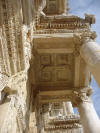Pictures of the Dig at Biblical Ephesus

A view down the road to the Library.
The Roman Civic Library, (Pictured Left) whose
façade has been carefully reconstructed from all
original pieces, was built ca. 125 B.C.E. by Gaius
Julius Aquila in memory of his father, and once held
nearly 12,000 scrolls. Designed with an exaggerated
entrance -- so as to enhance its perceived size,
speculate many historians -- the building faces east so
that the reading rooms could make best use of the
morning light. An underground tunnel, marked by the
simple figures of a woman, a heart, and a price, leads
from the library to a nearby building believed to have
been a drinking establishment or brothel.
Please Click the photos below to view the larger image

More Walkway Mosaics
Ephesus is
believed by many to be the Apasa (or
Abasa) mentioned in
Hittite
sources as the capital of the kingdom of
Arzawa.
Mycenaean
pottery has been found in excavations at the site. The many-breasted
"Lady of Ephesus", identified by Greeks with
Artemis,
was venerated in the
Temple of Artemis, the largest building of the ancient world,
according to Pausanias (4.31.8) and one of the
Seven Wonders of the World, of which scarcely a trace remains
Looking up under the entrance To the Library


A Broader view of the Library

A View Down The Road

Mosaic Sidewalk